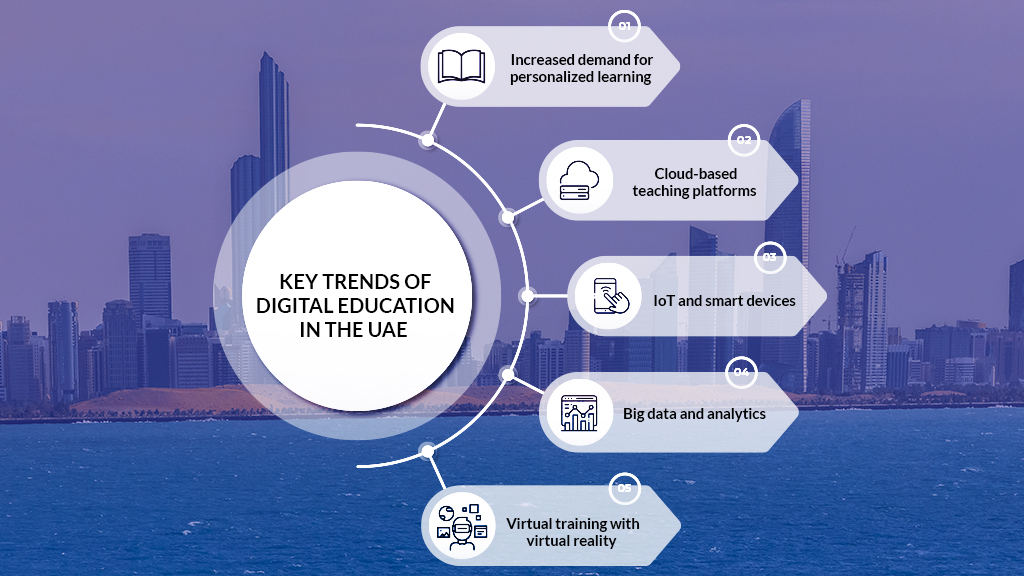Home » Cashless Payments Knowledge Hub » Digitization in Education: What are the Key Trends In The UAE?

While digitization is happening across most sectors such as banking, telecommunications, health, etc., educational institutes and schools are also not behind the race. The concept of homeschooling and smart learning are emerging as we see new transformations in the academic industry.
This blog explains how the digital revolution is impacting the education sector in the UAE and the key trends in educating students, onboarding teachers, providing training, and collecting school fee payments through an online platform.
As the United Arab Emirates moves ahead toward becoming a digital education leader worldwide, the government and the schools are joining hands to create a sustainable, high-class educational ecosystem.
Almost 93% of the UAE’s population has internet access, so creating a robust and secure digital education system is necessary. Moreover, the global pandemic in 2020 also caused schools to provide education online to students.
Thus, the government envisioned the need for creating a digitized platform to make educational inclusion for all. Let’s see the UAE government’s digital school initiative and the purpose behind creating it.
The UAE government also incorporated the digital school in 2020 to provide certified online education worldwide, especially to underserved children such as those living in refugee camps, rural areas, etc.
The course curriculums are compatible with the national and international curriculums. Hence, it is the first integrated, digitally-enabled school that caters to the underprivileged students to shape their future constructively.
Now that we have understood that the UAE has already made its remarkable presence in the move to digitize the education system let’s learn the key trends in this sector we will see in 2022.
The digital revolution in the education sector is increasing rapidly in the UAE. Everything is done online using advanced technology, from onboarding a student, imparting education and training to collecting school fees.
Also, read FAB and Aldar education launch digital fee payments through payit
Students of all ages demand more than they study in school and have their preferences; hence, they demand customization in their learning. The concept of ‘fit for all’ is outdated. Instead, the schools have realized the value of providing adaptable learning solutions to their students.
Thus, the digitization of the education system brings a personalized learning experience that will cater to the different requirements of different students.
The cloud-based learning platforms provide a host of opportunities, and teachers and experts across the globe can upload their lectures to the cloud. The advantage of such platforms is that they offer multiple options to learn one course from many different subject matter experts.
Moreover, these platforms also allow students to take exams and check their scores to evaluate their understanding of the course. These highly interactive and user-friendly digital learning methods enable students to learn from mobile apps.

With the help of the ‘Internet of Things’ or IoT, schools can efficiently manage their devices, from plugs to thermostats, and make them competent in the true sense. The IoT enabled in these devices can help schools gauge when the temperature control system must be turned on, understand the traffic patterns around the schools, etc.
From students’ class presence to monitoring their timely submission of the homework, IoT can automate many processes and increase the efficiency of the students and the schools.
Big data means large data sets that are too complicated to be analyzed by the traditional software. The schools have such big data about their students, and they can use it to identify the student patterns, expect their behavior patterns, and prepare their educational modules accordingly to best fit their students.
Big data analysis can also enable schools to understand the students’ responses to different types of information and which style is most suitable for which student. Accordingly, they can frame further courses for their students and help them improve their studies.
Although virtual reality (VR) was initially used for entertainment, it is considered one of the most crucial aspects of online education. VR enables students to experience practical situations virtually before facing them physically.
For example, students learning physics can experience different laws practically in the virtual world without leaving the classroom. Students with better practical training feel more comfortable when it comes to facing the real world.
Although digitization in the education system brings more efficiency and enables students to experience personalized learning, its security and privacy concerns remain challenging, and schools must ensure proper security measures are put in place to make it more fruitful.
Download the payit app from Apple Store or Google Play Store to:
Pay others who don’t have a bank account in the UAE